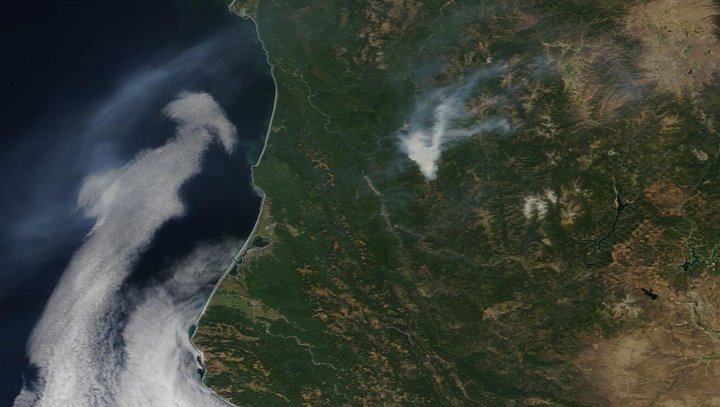
Satellite image of yesterday’s smoke conditions. | NASA
North Coast Unified Air Quality Management District press release:
The Red Salmon Complex (located in the far Northwest corner of Trinity County in the Wilderness) has resulted in growth to 8,138 acres with 35% containment, and the Jones Point fire is 75% contained and the fire will transfer to the Hoopa Fire Department later today. The USFS has an Air Resource Advisor (ARA) on this fire providing daily smoke outlook forecasts. ARA outlook forecasts also include fire behavior and knowledge of burnout operations.
Beginning yesterday, firefighters expected to have accelerated fire activity and increased burnout operations continuing for the next few days (depending on conditions). However, fire activity was minimal yesterday and smoke impacts did not reach the forecast levels.
Depending on conditions, there is still a plan in place to conduct extensive burnout operations, and if this activity occurs accelerated fire activity and smoke production is expected. Smoke impacts over the next few days are expected to be “Moderate” to “Unhealthy for Sensitive Groups” with periods of “Unhealthy” if fire activity remains minimal. If planned burnout operations and increased fire activity occurs the forecast levels will increase in areas adjacent and to the fire and along the Klamath-Trinity river corridors.
• Humboldt County - Coastal areas are expected to remain “Good” to “Moderate”. The areas near the fire, Orleans, Weitchpec, and Hoopa, are expected to be “Moderate” to “Unhealthy for Sensitive Groups” with periods of “Unhealthy” if fire activity remains minimal.
• Trinity County - Trinity County is forecast to see “Moderate” to “Unhealthy for Sensitive Groups” with periods of “Unhealthy” depending on proximity and fire activity.
• Del Norte County - Coastal areas are expected to remain “Good’ with periods of “Moderate” possible during afternoon. Eastern Del Norte County is forecast to see “Good” to “Moderate” with periods of “Unhealthy for Sensitive Groups” depending on proximity to the fire.
Particulate Matter (PM2.5) monitors are presently in Crescent City, Eureka, Weaverville, Hoopa, Weitchpec, Willow Creek, Klamath, and Trinity Center. Updates will be provided as conditions change. For 24-hour Air Quality Advisory Information, call toll-free at 1-866-BURN-DAY (1-866-287-6329).Health Information for Smoke Impacts
Concentrations of smoke may vary depending upon location, weather, and distance from the fire. Smoke from wildfires and structure fires contain harmful chemicals that can affect your health. Smoke can cause eye and throat irritation, coughing, and difficulty breathing. People who are at greatest risk of experiencing symptoms due to smoke include: those with respiratory disease (such as asthma), those with heart disease, young children, and older adults.
These sensitive populations should stay indoors and avoid prolonged activity. All others should limit prolonged or heavy activity and time spent outdoors. Even healthy adults can be affected by smoke. Seek medical help if you have symptoms that worsen or become severe.
If you can see, taste, or feel smoke, contact your local health department and/or primary healthcare provider. This is especially important if you have health concerns, are elderly, are pregnant, or have a child in your care.
Follow these general precautions to protect your health during a smoke event:
• Minimize or stop outdoor activities, especially exercise.
• Stay indoors with windows and doors closed as much as possible.
• Do not run fans that bring smoky outdoor air inside – examples include swamp coolers, whole-house fans, and fresh air ventilation systems.
• Run your air-conditioner only if it does not bring smoke in from the outdoors. Change the standard air conditioner filter to a medium or high efficiency filter. If available, use the “re-circulate” or “recycle” setting on the unit.
• Do not smoke, fry food, or do other things that will create indoor air pollution.
If you have lung disease (including asthma) or heart disease, closely monitor your health and contact your doctor if you have symptoms that worsen.
Consider leaving the area until smoke conditions improve if you have repeated coughing, shortness of breath, difficulty breathing, wheezing, chest tightness or pain, palpitations, nausea, unusual fatigue, lightheadedness.
CLICK TO MANAGE